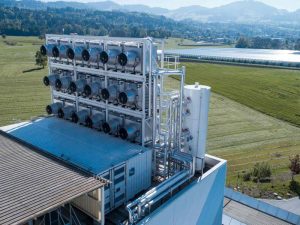By Jason Daley
The Swiss company Climeworks this week switched on its first carbon capture plant—a machine designed to remove carbon dioxide from the atmosphere. The company hopes to quickly scale up its technology and capture one percent of the global carbon dioxide produced by burning fossil fuels by 2025, reports Bobby Magill for Climate Central.
Located near the Swiss village of Hinwil on the roof of a garbage incinerator, the direct air capture technology uses a proprietary filter to absorb atmospheric CO2 as it passes through the plant, according to a press release. Once the filter is saturated, it is heated to 100 degrees Celsius, causing it to release the gas. The CO2 is then redirected to a greenhouse where it will help grow vegetables like tomatoes and cucumbers. The carbon boost could improve the lettuce harvest by up to 20 percent, according to the company’s website.
To achieve their goal of one percent, the company estimates they will need 250,000 plants the same size as the Hinwil unit, Magill reports.
Though the plant doesn’t result in net negative emissions, it is recycling the carbon dioxide for other uses, Magill writes. In order to actually achieve negative emissions the removed CO2 would have to be sequestered via capture in underground chambers or transformation into substances like rock.
In the future, the technology could also be used to capture and sequester carbon dioxide. But for now, the plant is giving CO2 emissions a function, rather than simply letting them go in the atmosphere. The company also sees potential in selling the captured CO2 to the beverage industry to carbonize drinks or producing a renewable hydrocarbon fuel.
“CO2 capture from air has been a very controversial topic in research for a long time,” Valentin Gutknecht, a business development manager at Climeworks tells Pultarova. “There was a belief that the cost can’t get down below $600 per ton of CO2 even at the mass scale. But we have managed to break this barrier.” As Magill reports, the company hopes to get the price down to about $400 per ton.
But the technology is controversial for more than its cost. Last year, leading climate scientists, including Glen Peters, published a paper in the journal Science arguing that the nascent technology directs focus away from reducing overall emissions. And it could cause complacency in some global leaders who believe that a future technological breakthrough could readily solve the climate crisis.
But Climeworks co-founder Christoph Gebald has no scruples about his project, he tells Magill. With effects due to climate change increasingly apparent, we need to use all tools possible to clean up global emissions.



